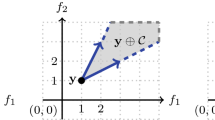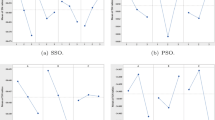Abstract
This paper presents a hybrid memetic algorithm for the problem of scheduling n jobs on m unrelated parallel machines with the objective of maximizing the weighted number of jobs that are completed exactly at their due dates. For each job, due date, weight, and the processing times on different machines are given. It has been shown that when the numbers of machines are a part of input, this problem is NP-hard in the strong sense. At first, the problem is formulated as an integer linear programming model. This model is practical to solve small-size problems. Afterward, a hybrid memetic algorithm is implemented which uses two heuristic algorithms as constructive algorithms, making initial population set. A data oriented mutation operator is implemented so as to facilitate memetic algorithm search process. Performance of all algorithms including heuristics (H1 and H2), hybrid genetic algorithm and hybrid memetic algorithm are evaluated through computational experiments which showed the capabilities of the proposed hybrid algorithm.
Similar content being viewed by others
References
Baker K. R., Su Z. S. (1974) Sequencing with due dates and early start times to minimize maximum tardiness. Naval Research Logistics Quarterly 21: 171–176
Blazewicz J. (1987) Selected topics in scheduling theory. Annals of Discrete Mathematics 31: 1–60
Čepek O., Sung S. C. (2005) A quadratic time algorithm to maximize the number of just-in-time jobs on identical parallel machines. Computers & Operations Research 32: 3265–3271
Davis E., Jaffe J. M. (1981) Algorithms for scheduling tasks on unrelated parallel processors. Journal of the Association of Computing Machinery 28: 721–736
Hall N. G. (2001) Generating experimental data for computational testing with machine scheduling applications. Operations Research 49(7): 854–865
Hall N. G., Rhee W. T. (1986) Average and worst-case analysis of heuristics for the maximum tardiness problem. European Journal of Operational Research 26: 272–277
Hiraishi K., Levner E., Vlach M. (2002) Scheduling of parallel identical machines to maximize the weighted number of just-in-time jobs. Computers & Operations Research 29(7): 841–848
Holland J. H. (1975) Adaptation in natural and artificial systems. The University of Michigan Press, Ann Arbor, MI
Huang, J. C.-C. (1995). Decision support system for lumber procurement and dry kiln scheduling: A fuzzy system theory application. Industrial Engineering Department, Unpublished Ph.D. Dissertation. North Carolina State University, Raleigh, NC.
Lann A., Mosheiov G. (1996) Single machine scheduling to minimize the number of early and tardy jobs. Computers & Operations Research 23: 765–781
Lenstra J. K., Schmoys D. B., Tardos E. (1990) Approximation algorithms for scheduling unrelated parallel machines. Mathematical Programming 46: 259–271
Li C.-L., Lee C.-Y. (1997) Scheduling with agreeable release times and due dates on a batch processing machine. European Journal of Operational Research 96: 564–569
Mitchell M. (1996) An introduction to genetic algorithms. Massachusetts Institute of Technology, London, England
Moscato P. (1999) Memetic algorithms: A short introduction. In: Corne D., Dorigo M., Glover F. (eds) New ideas in optimization. McGraw-Hill, New York, pp 219–234
Panwalkar S. S., Iskander W. (1977) A survey of scheduling rules. Operations Research 25: 45–61
Piersma N., Van Dijk W. (1996) A local search heuristic for unrelated machine scheduling with efficient neighborhood search. Mathematical and Computational Modelling 24: 11–19
Portmann, M. C. (1996). Genetic algorithms and scheduling: A state of the art and some propositions. Proceedings of the Workshop on Production Planning and Control, Mons, Belgium.
Potts C. N. (1985) Analysis of a linear programming heuristic for scheduling unrelated parallel machines. Discrete Applied Mathematics 10: 155–164
Rabadi G., Moraga R. J., Al-Salem A. (2006) Heuristics for the unrelated parallel machine scheduling problem with setup times. Journal of Intelligent Manufacturing 17: 85–97
Sahni S., Cho Y. (1980) Scheduling independent tasks with due time on a uniform processor system. Journal of the Association for Computing Machinery 27: 550–563
Sung S. C., Vlach M. (2005) Maximizing weighted number of just-in-time jobs on unrelated parallel machines. Journal of Scheduling 8: 453–460
Suresh V., Haudhuri D. C. (1994) Minimizing maximum tardiness for unrelated parallel machines. International Journal of Production Economics 34: 223–229
Toksarı, M. D., & Güner, E. (2009). Parallel machine scheduling problem to minimize the earliness/tardiness costs with learning effect and deteriorating jobs. Journal of Intelligent Manufacturing. doi:10.1007/s10845-009-0260-3.
Yaghubian A., Hodgson T. J., Joines J. A., Culbreth C. T., Huang J. C. (1999) Dry kiln scheduling in furniture production. IIE Transactions 31: 733–738
Author information
Authors and Affiliations
Corresponding author
Rights and permissions
About this article
Cite this article
Jolai, F., Amalnick, M.S., Alinaghian, M. et al. A hybrid memetic algorithm for maximizing the weighted number of just-in-time jobs on unrelated parallel machines. J Intell Manuf 22, 247–261 (2011). https://doi.org/10.1007/s10845-009-0285-7
Received:
Accepted:
Published:
Issue Date:
DOI: https://doi.org/10.1007/s10845-009-0285-7




